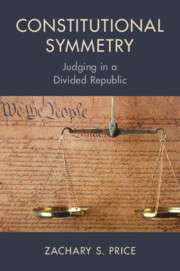The Volokh Conspiracy
Mostly law professors | Sometimes contrarian | Often libertarian | Always independent
Zachary Price Guest-Blogging About His New Book, "Constitutional Symmetry: Judging in a Divided Republic"

I'm delighted to report that Prof. Zachary Price (UC Law San Francisco) will be guest-blogging this week about his new book. The publisher's summary:
Intense political disagreements over constitutional law and the Supreme Court have divided America. Constitutional Symmetry offers a fresh perspective by urging judges to make decisions that work 'symmetrically' across major partisan and ideological divides instead of favoring one partisan coalition over the other. Zachary S. Price argues this approach will aid the political process, align with the role morality of judging, and advance the framers' hopes for the Constitution. Chapters explore how this approach can encourage new solutions to fraught debates over free speech, religious liberty, separation of powers, federalism, affirmative action, gun rights, abortion, parental rights, and the law of democracy. Timely and innovative, this book is must-read for anyone seeking to understand the sources and implications of constitutional polarization in the contemporary United States.
And the jacket blurbs:
Constitutional Symmetry could be the most important book in constitutional theory in decades. Cutting across the now familiar categories of originalism, living constitutionalism, and pragmatism, Zach Price's book frames constitutional debate in a way that offers something to both sides of the spectrum—and thus charts a path out of the polarized antagonism that now engulfs the courts. —Michael W. McConnell, Richard & Frances Mallery Professor, Stanford Law School
Constitutional law is different from politics, but should the one take account of the other? In this brilliant, challenging, and wide-ranging book, Zachary Price answers with a resounding Yes. The polarization now gripping our nation cannot be ignored, and Price argues that the Supreme Court should mitigate its effects, not worsen them. Anyone interested in a fair and neutral judiciary should read this book. —Richard M. Re, Professor of Law, University of Virginia School of Law


Show Comments (1)